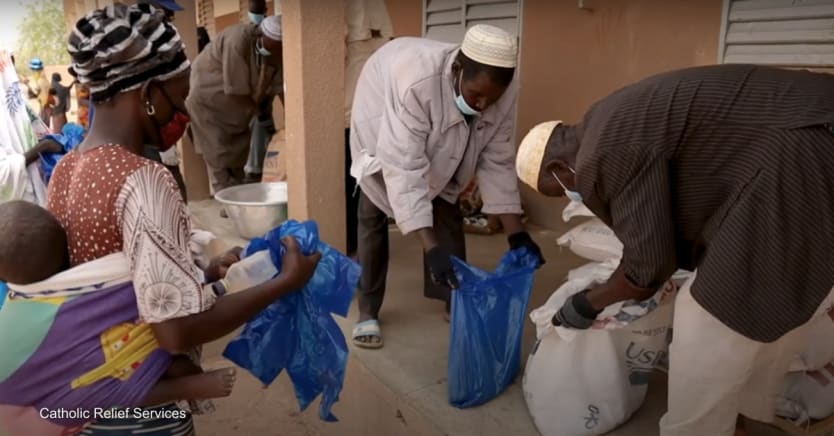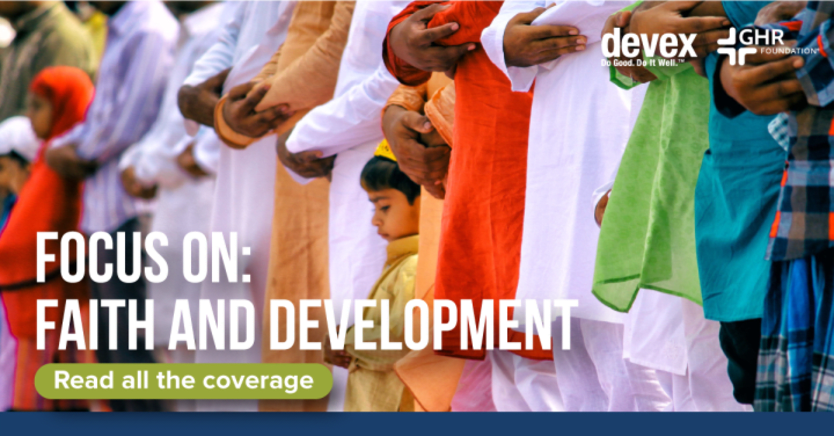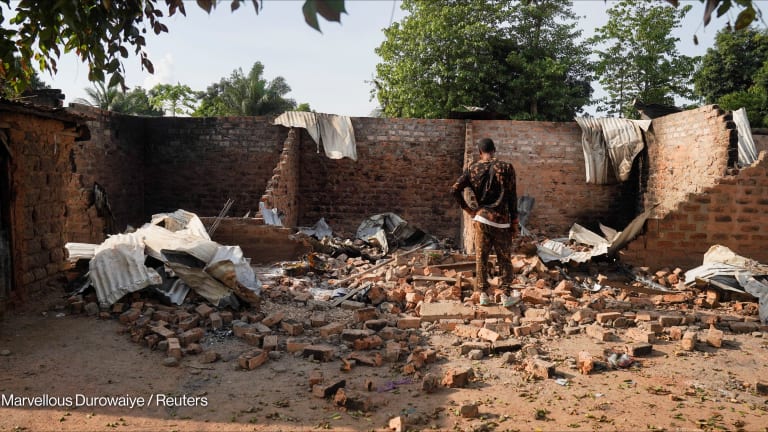
Even before extremist violence began to spread instability across the Sahel a decade ago, countries in the region were already experiencing a host of challenges, including poverty and high unemployment rates.
People in Burkina Faso, Mali, and Niger, as well as neighboring Ghana, continue to struggle with food insecurity and a lack of economic opportunity, as well as heightened, ongoing conflict. In certain places, religious leaders are taking an active role in promoting community-led development and peace building, using their positions as trusted local figures to increase interreligious understanding and cohesion amid broader societal collapse.
“Interreligious dialogue provides the opportunity for the different religions in our country to come closer together and to love each other,” Sheikh Al-Hussein Zakaria, imam at Quran Mosque in the Ghanaian city of Tamale, told Devex.
“You see, the further you are away from each other, the more suspicious you are about the intentions and what the other religious people think about you. But once you come closer and move the barriers, you get to understand each other more. And when we understand each other, we get to know where our weaknesses are and where our strengths are. This helps us to be able to work together,” he said.
“We are talking about violent extremists being a threat to all of us. Working together allows us to be able to think together and figure out a response to such threats,” he continued. “If we work together as religious people, we put ourselves in the position to deal with such issues more decisively than when we are more divided and addressing it from our individual capacities.”
Zakaria is working with the Most Rev. Philip Naameh, archbishop of Tamale and president of the Ghana Catholic Bishops’ Conference, to facilitate interreligious dialogue and understanding in their community. Naameh said that although faith communities may worship in different ways, he sees different religions as addressing their prayers to the same God.
This dialogue helps people from separate faith traditions, who may have thought they were too different from or even in opposition to one another, recognize that they can collaborate on shared development challenges, he said.
“If religions are in conflict, it can only trigger further conflict. So religions should be factors of peace but not division.”
— Monsignor Théophile Nare, bishop of Kaya in Burkina Faso“In Ghana, I think we came to the realization that you can generate a lot of … [assumptions] about someone you do not really know about,” Naameh said. “When you have this awareness, you realize that you push away all tensions and all barriers which you put among yourselves. They are not put there by God. So that is the power of interreligious dialogue.”
Efforts by Zakaria and Naameh in Ghana, as well as by other religious leaders across the Sahelian countries, are being supported by Catholic Relief Services through its Sahel Peace Initiative. The community-driven program began in 2019 at the behest of organizers in the Roman Catholic Church who saw how incapable their governments were of responding to escalating violence and accompanying barriers to development. They wanted to use their roles as trusted leaders to help broker understanding and peace building in their communities.
Muslim and Catholic leaders also work with leaders of the region’s traditional religions on the program. Other NGOs that work in the Sahel, such as Islamic Relief, are involved as well.
Its activities “run the gamut” of advocacy and communications work, humanitarian response and development programs, and peace building, said Pat Williams, Sahel Peace Initiative program manager with CRS. Many of these efforts — such as improving livelihoods and responding to basic humanitarian needs with food, water, and shelter — were already being done by the Catholic Church, with the initiative funneling money to support these endeavors, he added.
While much of the international response to extremist violence in the Sahel has focused on national security measures or diplomacy, the CRS program promotes peace at a grassroots level, helping build relationships with young people who may be at risk of joining extremist groups, Williams said.
“The [U.S. government] and U.S. institutions, we’ve already invested so much in West Africa, so it seems like a shame to let conflict erode some of those gains that we’ve made — and we very much need to preserve those development gains,” he said, noting that many perpetrators of violence and nonstate armed groups aim to split communities along ethnic or religious lines.
“So the more we look like we’re working together, the more we do public events and public projects, do them all together, it really reinforces … the cohesiveness of the communities.”
Zakaria said some other Muslims in his community did not immediately recognize the benefits of interreligious dialogue and tried to discredit the practice. But he and other faith leaders have sought to communicate the intended goals of this work and how it could help solve local, regional, and international challenges. Now, the community no longer asks why interfaith collaboration is worth spending time on, he said.
The Sahel Peace Initiative’s field teams identify religious leaders who would be productive partners for strengthening community cohesion, Williams said, and program staffers use WhatsApp to maintain established relationships with leaders of different sects that may not share every belief. In Niger, working with imams or priests who spread “unproductive messages” can be particularly challenging, he said.
Part of our Focus on: Faith and Development
This series illuminates the role faith actors and their communities play in strengthening global development outcomes.
“Religious leaders could also be a force for ill. And we need to make sure we don’t allow that to happen, because that’s going to erode trust in ... religious leaders but also erode the support that we could potentially receive from outside of the individual countries,” Williams said.
“Working with our teams, we identify those who are catalysts for good and amplify their voices. One of the big challenges we’ve had so far is just that the Sahel is an incredibly diverse community.”
The initiative is currently being funded by CRS and the Catholic Church, but Williams said they are always looking for additional partners to join. It has no set time frame, and participants said they hope its efforts will continue.
“God is positivity. … It is in the name of this belief that we decided to get involved in the interreligious dialogue,” Monsignor Théophile Nare, bishop of Kaya, Burkina Faso, said through an interpreter. “If religions are in conflict, it can only trigger further conflict. So religions should be factors of peace but not division.”
Devex, with support from our partner GHR Foundation, is exploring the intersection between faith and development. Visit the Focus on: Faith and Development page for more. Disclaimer: The views in this article do not necessarily represent the views of GHR Foundation.









